Home <- Writing <- Sex, Love, and Hookups in the Time of Social Media
Editor's note: This article was originally published 6-30-13 and has been updated:
Sex, Love, and Hookups in the Time of Social Media by Brad Hines 2-13-14 12:01 am
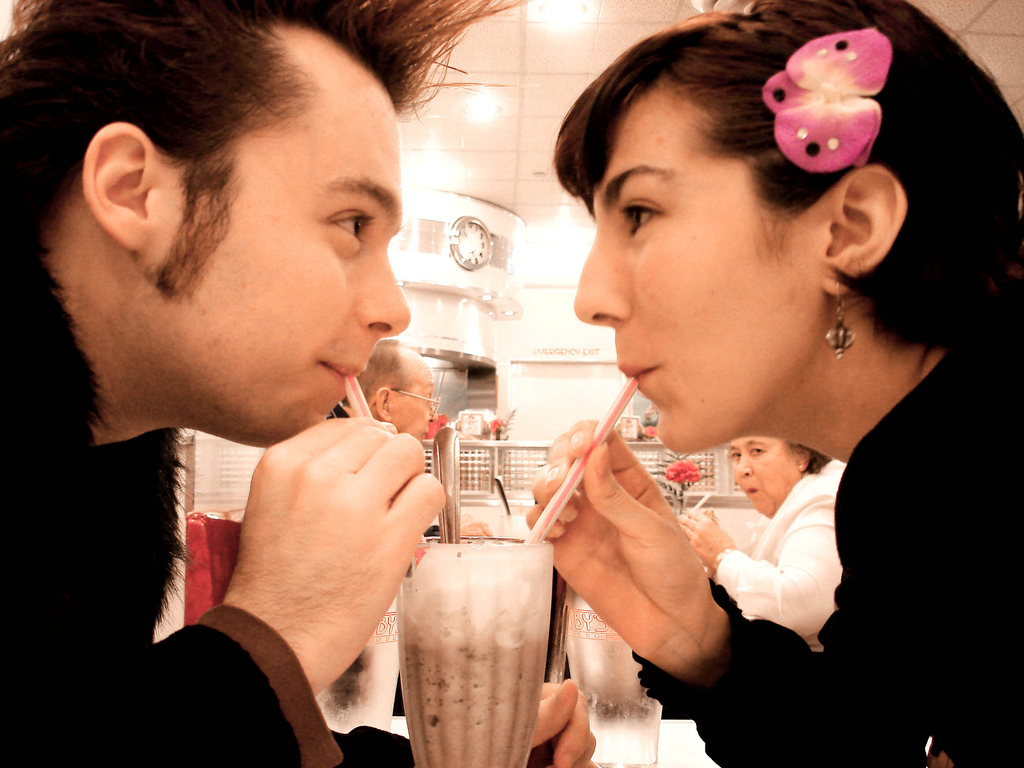
We are in a funny time sexually and romantically speaking. Don't think so? Think about the difference between how people searched for romance, love, and lust; between today, and only ten years ago.
According to Reuters, 40 million Americans have tried online dating, and at last count, it was a $1.049 Billion industry.
There are countless online networks for sex, dating, or just 'hooking up'; and they cater to every kind of type, religion, and hobby—okay, every kink–—imaginable. There is now also even virtual sex—different than "cyber sex" mind you— and a promising new app to revolutionize sexual health.
Is all this stuff helping us find love or get our freak on any better?
Dating Websites and You. The Perfect Match?
It is a daunting premise to be relying on algorithms to dictate anything in our lives, let alone to use them for suggesting who we ought to end up with for the rest of our life. (See my Techopedia article from the last fall on this: Are Social Media Algorithms Getting Out of Hand? 11-26-12.).
So "Big Data", has been affecting literally everything in our day-to-day lives in the last decade, and now; how we get busy is no different. Websites like Match.com and OkCupid promise to pair us up almost perfectly using those algorithms I spoke of, based on a glut of data. In recent years taking "perfect match" approach reached an extreme where there was even science based dating sites that demanded a swab of your cheek sent to them in the mail—gimme your DNA please—and with that, the promise to link you up with someone in their database who was genetically speaking, literally perfect chemistry with you based on your genes. 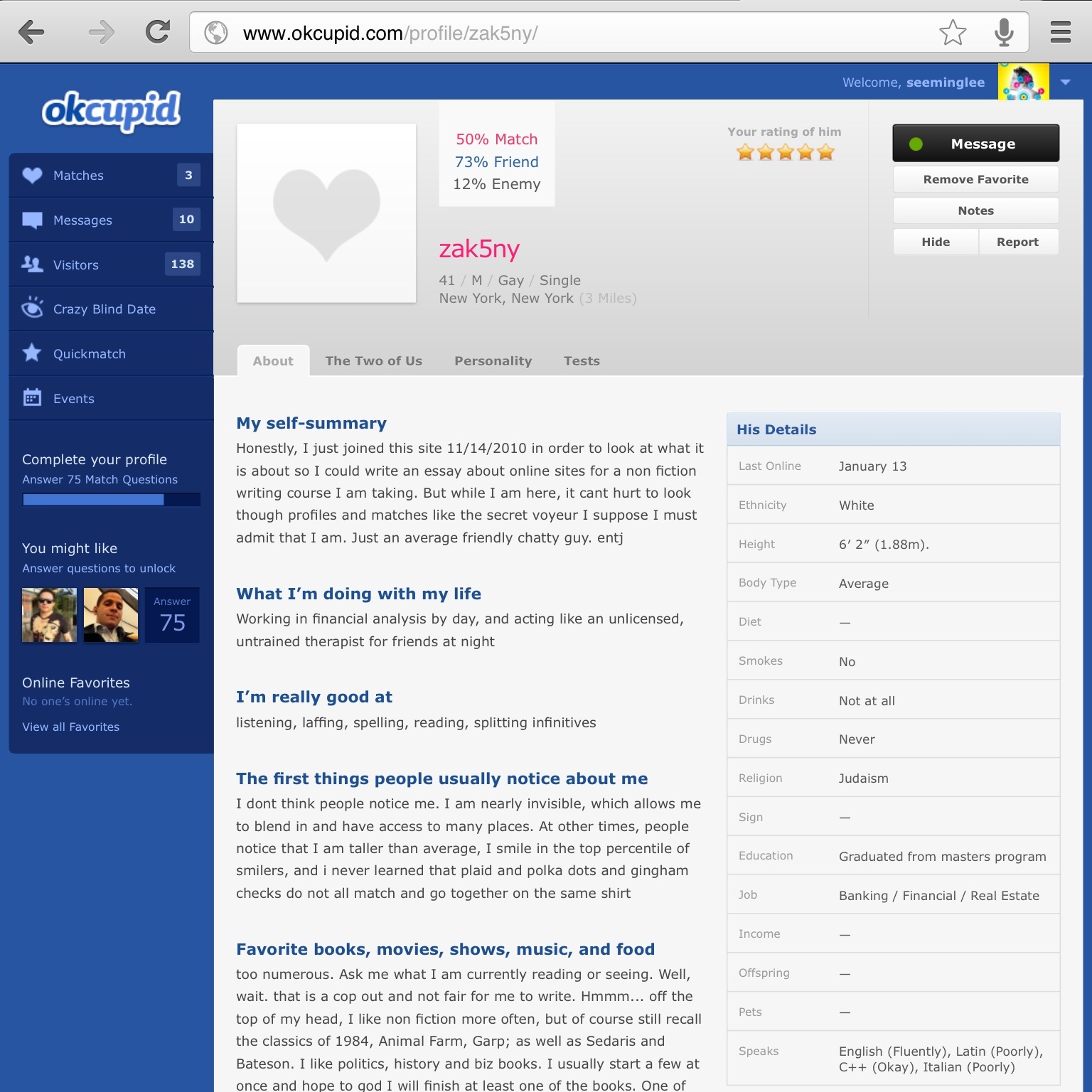
One of the interesting aspects of the big dating data crunch is not just how sites can match people up, but what the data scientists can infer from it all, and in turn, how people like you and me can use it to apply to their own dating life.
How might you feel for instance, if you agreed to go out with someone after seeing their "impressive" OkCupid profile, and then that it turned out that profile had been keyword stuffed and written just like a Search Engine Optimizer (you may have seen the recent story about how Mathematician Chris McKinlay did just that when he optimized his OKCupid experience). But In this hypothetical scenario, you discover that your date had custom tailored their profile based on the data from OkTrends, the OkCupid data blog that tells users what types of wording and photos in profiles are most successful based on inferential data. For example, according to OkCupid's data of its users, men seem to skew their listed height upwards by about an inch. The data, however, doesn't fall short; later here you will see examples of such dating-data you can use yourself, but in a more scrupulous way.
Crushing Info
So one of the general trends that seems to exist now from online dating, is people's sheer selectivity in others; above and beyond what already existed in decades past. Many of course are not themselves on their profiles at all. One young woman I spoke with, we will call her Mandy, admitted to me she was really on the site just for the sake of attention. Mandy said,
"Dating on OKCupid is a great self esteem booster. I'm mainly on it for the compliments. Compliments from single dudes, compliments from the website itself and sometimes compliments from married couples looking for a girlfriend."
Comments like Mandy's are indicative of a major pitfall seen in online dating– people spending too long getting to know the other virtually, only to be disappointed when they meet. After all, how can the reductive nature of online discussion really carry across the nuance of what we find attractive in others, think: their voice, movements, laughter, etc. And of course that nuance is completely gone if the person is just plain lying to you. Many dating experts therefore recommend meeting as soon as safely possible, and some online dating websites have even sprung up around the idea of banishing the isolation and all-around anonymity that typically come with the field. Sites like HowAboutWe, essentially force users to go on a date almost immediately. The point of the site after all is based around the premise of the date itself–clever date suggestions.
Love and Sex therapist Dr. Ava Cadell takes a positive view on online dating in general observing to me about how it can not only help shy people find others and break the ice with them, but that we can more easily find people with exact interests, she says:
"The most positive thing about the digital age is that many people who were too shy to go out and meet dates now have the opportunity to connect with other single people who are looking for the same kind of relationship whether it's for marriage, dating, hooking up, swinging or cybersex..."
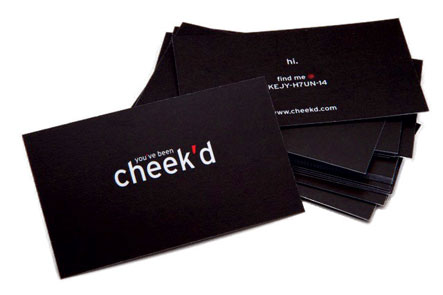 Startup Cheek'd is another fascinating site in the space. Cheek'd encourages us to be so bold, by reversing the online dating process, where very un-shy people can meet first, and then use online profiles later. The dating site issues new users a set of flirty cards (left) for which they are urged to hand out to people in person who catch their eye. After having received a Cheek'd card, the checking-out online part happens afterwards. Founder Lori Cheek will be appearing on ABC's The Shark Tank February 28th 2014.
Startup Cheek'd is another fascinating site in the space. Cheek'd encourages us to be so bold, by reversing the online dating process, where very un-shy people can meet first, and then use online profiles later. The dating site issues new users a set of flirty cards (left) for which they are urged to hand out to people in person who catch their eye. After having received a Cheek'd card, the checking-out online part happens afterwards. Founder Lori Cheek will be appearing on ABC's The Shark Tank February 28th 2014.
Some More Ways We Find Love Now, and What it Says About Us
Hookups, API's, and Facebook"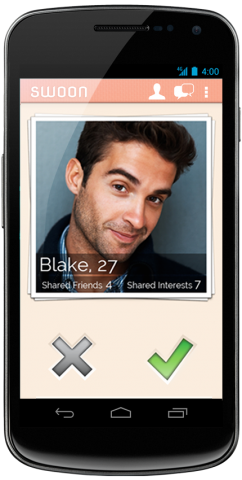
In the Internet development world, there is something called an API, or application program interface, which essentially just means that websites lend out their data to other Internet developers to piggy back off of it. You have used one any time you have joined a website using your Facebook information. Being very open with their data, Facebook is allowing for all kinds of love and lust apps to spring up based on their—and if you use Facebook—your information.
Tinder and Swoon for example each use your Facebook data, and all there really is to the interfaces, are looking at photos of people you don't know and checking them off as a green check mark, or a red "X" (see right). If you mutually check each other off, it puts you in touch. The app offers essentially nothing about you other than your photo. Good for ruggedly handsome and perhaps jobless Blake, bad for "ugmo" congressional medal winners.
Let's take a look at the perhaps tackier side of these apps. So there is a very 'modern' term you may have heard by now called "Friends with benefits"- yes, like the eponymous Justin Timberlake and Mila Kunis film. Similarly, there is the more pejorative term "Fuck Buddy". However long this phenomenon of a casual sex partner has existed, the Internet has certainly been there for it in full effect.
There has long been the controversial Craigslist casual encounters section, and now since only last winter there is the much talked about Bang With Friends app. The Facebook-linked app allows people to choose anonymously amongst their Facebook friends, who they'd like to have casual sex with. If mutually chosen by the person you select, the app then puts you each in touch with the other. I spoke in March 2013 with one of the co-founders, who somewhat nervously told me to simply call him "Colin". When I asked what the impetus was for starting the unique app, Colin told me "We [him and his two co-founders] we're sick and tired of the bullshit online dating sites and people on them not honest about their intentions". Later he declared matter-of-factly, "It's okay to just want sex."
Skout, Blendr, Grindr, Tinder, WhoreSquare and Location Awareness
Okay I made that last one up, there is no app named Whoresquare. But all these apps use the user's location to try and find them a match. In any of these apps, you grant the app permission to use your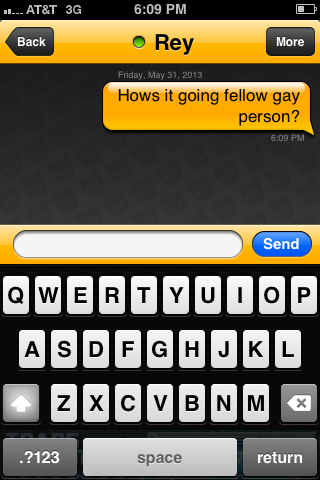 location, and immediately it clues you in to interesting prospects in the area. One of the first things many a millenial do when getting off the airplane now on vacation, is opening up Tinder to see who's available.
location, and immediately it clues you in to interesting prospects in the area. One of the first things many a millenial do when getting off the airplane now on vacation, is opening up Tinder to see who's available.
So I tried many of them, including LGBT community oriented Grindr which seems to own the field; and immediately I was chatting with people as close as only a few hundred feet away, who potentially wanted to meet. Given my horrible flirting-with-men skill set, I eventually admitted to being a journalist ("Rey" shown right, is yours truly), where I then asked one user if he felt that the app was safe, like, there could be people on the app pretending to be someone else, ahem. "Gary" explained to me that a lot of it came down to common sense. Whether or not dating is safer now or less than ten or twenty years ago, is not something I will be writing about here, as there seems to be so much contrarian data when I investigated it. Online dating in general, particularly with location awareness sites certainly can be dangerous. Online dating expert for DatingAdvice.com Julie Spira, and Dr. Carole Liberman did offer my readers tips for online dating safety.
Look, But Don't Touch. Virtual Sex and the 'Kinkier' Side of the Digital Age.
 As soon as the advent of the phone, people began having relations on it. When chat groups came up in the early 90s, it was then "cybersex". Now of course we have, sexting, and apps like Snapchat and teenagers and politicians alike getting themselves into trouble sending photos of their Anthony Weiners. It gets kinkier. Enter teledildonics, a term that I just can't make up. Teledildonics is bluetooth enabled sex toys, that can be operated by a partner remotely, the ultimate in long distance intimacy, and William Gibson's dirty dreams.
As soon as the advent of the phone, people began having relations on it. When chat groups came up in the early 90s, it was then "cybersex". Now of course we have, sexting, and apps like Snapchat and teenagers and politicians alike getting themselves into trouble sending photos of their Anthony Weiners. It gets kinkier. Enter teledildonics, a term that I just can't make up. Teledildonics is bluetooth enabled sex toys, that can be operated by a partner remotely, the ultimate in long distance intimacy, and William Gibson's dirty dreams.
Like a lot of technologies slowly catching on, this one has actually been around for awhile now. WIRED wrote a cheeky piece about it in 2004 saying,
| "...a man can be thrusting in Cleveland while a woman is penetrated in Seattle, and the cybersex experience gets one step closer to the holodeck." |
There would seem to be a lot of opportunity in this market from the couples traveling separately, or otherwise in long term relationships. Dr. Cadell describes teledildonics as "innovative" and points out that they can also be used to assist people with physical disabilities. Why this kind of technology has been so slow to catch on, I had speculated largely has to do with how strange people find it, but Cadell offered me this:
"...they are expensive, not easily accessible and there hasn't been enough positive feedback from professionals such as therapists, medical doctors and scientists."
The current leader in the field, so it would seem, is lovepalz.com; they have been receiving a tremendous amount of press. Watch the safe for work embedded video to get a feel for them (sorry, it was going to be impossible to write this piece without at least a couple innuendos slipping in.)
Up and coming competitor to Lovepalz is startup Kiiroo, who at the time of this writing have an Indiegogo campaign with a 1/3 their goal met.
How This Sexed-Up Digitalized World Might Actually Helps Us
All these apps and sites seem to be affecting the general dating psyche if you will. It would seem online dating has made the nature of selectivity worse, expectations higher, meaningless sex on the increase, and one recent article suggest that people don't even date anymore. So Is there an upside?
Qpid.me: Shortly after the SXSW festival spring 2013, I spoke with Ramin Bastani, founder of startup Hula, formerly known as Qpid.me. Ramin and Hula are spearheading a revolution in sex regarding our health in what is hopefully the biggest thing since the ('Magnum'?) condom. He was struck with inspiration quite literally, after a girl actually slapped him across the face in the bedroom after he had asked her delicately if she had had any STD's.
Bastani declared "...and right after she slapped me, she told me to fuck off...and I thought to myself, there has to be a better way than this." So he brought social media, and gamification to an otherwise stuffy and unsexy premise. Bastani, who struck me as a founder as optimistic as he was driven, seems to want to make Hula the thing people remember sometime in between making out and putting on the condom. "We help people make better decisions before sex" he tells me enthusiastically, and in a way that makes you believe he'll pull it off.
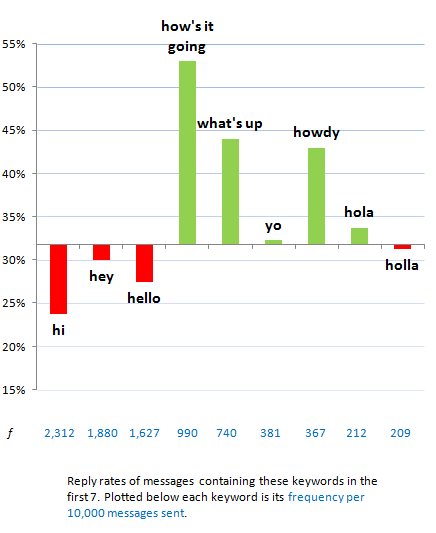 Romanticizing Data. "How's it going?":
Romanticizing Data. "How's it going?":
On OkCupid, or "Okay Stupid" as my mom likes to call it, that mass of data that I spoke of from their blog can be applied to help us all in a benevolent way vs. a negatively manipulative one. The same way in the film Hitch, Will Smith's character Chris Hitch explains that he is teaching men to accentuate their best selves so that "Good guys can actually have a chance" (maybe these guys getting slapped like Bastani?) Now everyone—men and women alike—can romantically benefit from hard cold data from the sites like what OkCupid and Match.com have provided us. For example, in the OkTrends blog, one of the things they have measured is what greetings to the opposite sex best get a response back (left). Men for example, can see definitively in another graph shown here, that women actually don't want their physical appearance commented on in a first message, even if it is a positive comment. The data doesn't lie, and as more of it comes in, it does tend to get more accurate.
The Future of Digital Love
Looking at data on how couples get together in relationships may be lacking in romance on the face of it, but not to data scientists. Logically, they know, if the right people get together, the divorce rate could surely go down over time if there is better pairing of people to begin with. If information can craft a world with less divorce, isn't that something we should look into? Spira makes an interesting opposing observation:
"It’s interesting to note the large percentage of divorce filings that mention Facebook. The ability to cheat emotionally through social media is rampant. Late night chats with ex-lovers or with someone you’ve developed an online rapport with can be very harmful to relationships."
And now we can add teledildonics to the mile long list of ways to cheat; like that awkward moment when 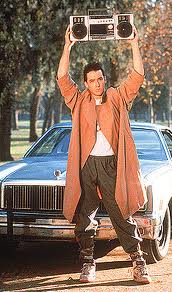 your partner asks you who is on the other end of that apple-pie-shaped blue tooth device–you catch my drift.
your partner asks you who is on the other end of that apple-pie-shaped blue tooth device–you catch my drift.
Not everyone takes a dim view, Erin Goldman notes the myriad of ways to find a person now to connect if you met in person and want to take the relationship further:
"I met my boyfriend at a party and we did not exchange numbers but we both looked to the internet to find each other the next day. I followed him on Twitter. He sent me a facebook message asking me out. We've been together ever since. I appreciate this modern day convenience and find it to be one of the positive aspects of digital age dating."
How all this technology will continue to affect us is yet to be seen. Perhaps digital dating, in it's infancy after all, simply needs to get past first. In the interim, we can always fall back on saying "hello" to people, it did work for a long time before technology. Hey, if art imitates life, then à la the 80's rom-com film Say Anything, I'd like to point out that John Cusack's character Lloyd definitely didn't meet Diane on OkCupid, and it wasn't an iPhone streaming Spotify that he held over his head.
Takeaway: The rapid evolution of digital technology has brought with it changes in how humans go about intimacy, at a pace at times exceeding our ability to adjust to it. As a result people are working through the kinks. Pun pervertedly intended of course.
Shop to help support our content habit: Full disclosure, you may find these products awesome.
 About the author: Brad Hines is the president of YumDomains.com, and the founder of HungryKids.org. He is a digital marketing and social media strategist. A writer as well, he typically writes about Internet, business, and science trends. He has been known to get his flirt on, especially with companies he helps do their marketing better. He can be followed on Twitter:
About the author: Brad Hines is the president of YumDomains.com, and the founder of HungryKids.org. He is a digital marketing and social media strategist. A writer as well, he typically writes about Internet, business, and science trends. He has been known to get his flirt on, especially with companies he helps do their marketing better. He can be followed on Twitter:
Other Articles You May Like: